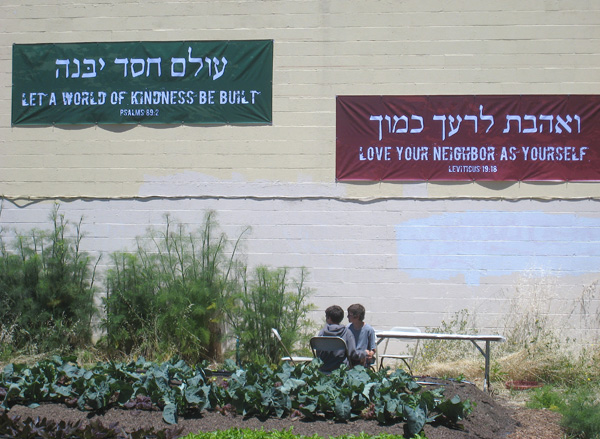
Inner-city agriculture is booming in the Bay Area. While all urban farms aim to heal the world, Berkeley's newest such enterprise is going at it from an environmental, educational, social-justice and spiritual angle. As far as heaven and earth are concerned, they've got it covered.
"For thousands of years, Jewish people -- like most people in the world -- were farmers," says Urban Adamah's founder, Adam Berman. "Even if you were a tailor or a carpenter, you still grew your own food. If you scratch the surface of Jewish tradition, you see agriculture and the cycle of nature everywhere -- from blessings where we address the Lord 'who creates the fruit of the earth' to biblical narratives filled with connections to the natural world."
After earning an MBA from UC Berkeley's Haas School of Business in 2001, Berman became the executive director of Connecticut's Isabella Freedman Jewish Retreat Center. That's where he founded what he calls "Adamah 1.0" -- a three-month fellowship program that trained twenty-something intellectuals how to farm.
Adamah means "ground" or "land" in Hebrew.
The program had three prongs: Avodat sadeh, or "service of the field," entails agricultural training and labor. Avodat kehilah, or "service to the community," entails volunteerism and off-site environmental-justice internships. Avodat lev, or "service of the heart," entails daily prayer and other metaphysical practices such as yoga and qigong. Limmud, or "learning," comprises classes in environmental justice, environmental education, leadership training, and Jewish studies.
"The core values that have guided Jewish tradition for thousands of years are kindness, love, and justice," Berman says. "Today we find ourselves in circumstances in which access to healthy food is not available to everyone, even in the richest country in the world. How do we take those Jewish core values into the reality of the 21st century? How shall we manifest them today?"
After seven years in Connecticut, he wanted to transport his program out west, where he could practice using materials salvaged from the urban-waste stream to grow organic produce that could be given away locally. Berkeley seemed the ideal spot for Adamah 2.0 -- so he persuaded a developer to loan him a one-acre lot just off rough-and-tumble San Pablo Avenue. On June 19, Urban Adamah officially opened -- complete with greenhouses, cob oven, chicken run, and dozens of raised beds, where summer greens flourish under huge banners bearing Old Testament quotations.
The site is a two-year loan, so a key part of Urban Adamah's construction was that all its components must be deconstructed two years hence and moved elsewhere.
"It's completely possible to take up temporarily vacant space in cities and then move your materials with you to other sites," Berman says. "Just use things that can be taken apart and rebuilt."
Thus the chicken run, now bustling with birds, is modular and mobile. Ditto the greenhouses. The oven, made mainly from mud, rests atop a transit-ready recycled-wood pallet. A trailer houses Urban Adamah's office. Classes and other activities take place on carpets, under tents. Plastic-and-copper irrigation pipes can be removed and relocated. Even the raised plant beds are made to be moved -- soil and all.
How to build a totally portable raised bed for under $10?
Start with a recycled hardwood pallet costing $3.50. Around its edges, affix gopher-repellent wire-mesh "walls" costing $5.40. Reinforce these with about 30 cents' worth of scrapwood. Cover the pallet and mesh in burlap sacks, acquired free from local cafes. To protect both cloth and wood from rot, top the burlap with a $2.70 layer of food-grade plastic.
"At moving time, you don't even have to empty out the earth," Berman explains. Using a forklift truck, "you can actually lift it up with the crops inside."
Much of the farm's output goes to food-giveaway programs at a nearby church and low-income clinic.
"We're using the lens of agriculture and nature to explore things that everybody knows are part of Jewish tradition," Berman says. "But doing it in this way gives those things a richness and depth that you might not ever experience otherwise."


